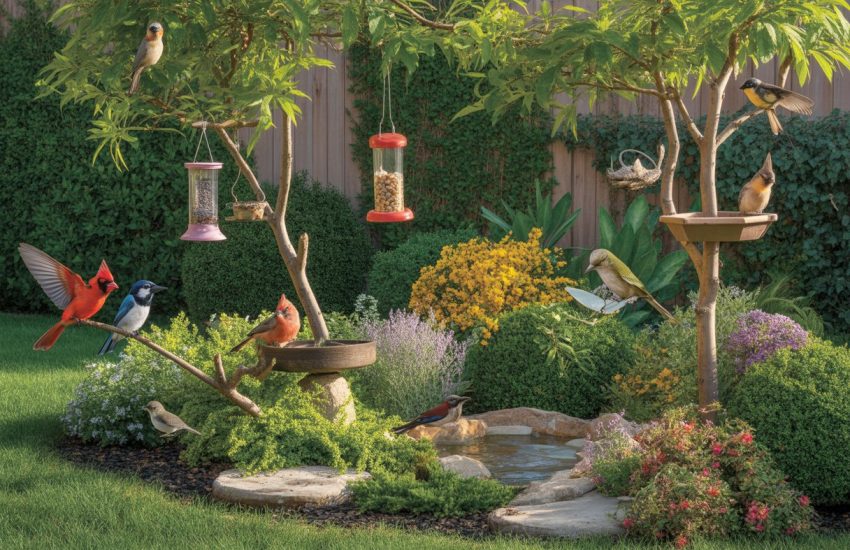Fruit Flies in Plants: Causes and Prevention
Last updated: January 31, 2026
Fruit flies in plants are a common problem for gardeners and farmers alike. These tiny insects, also known as vinegar flies or Drosophila, are attracted to ripe and decaying fruits and vegetables. While they may seem harmless, fruit flies can cause significant damage to crops and plants.
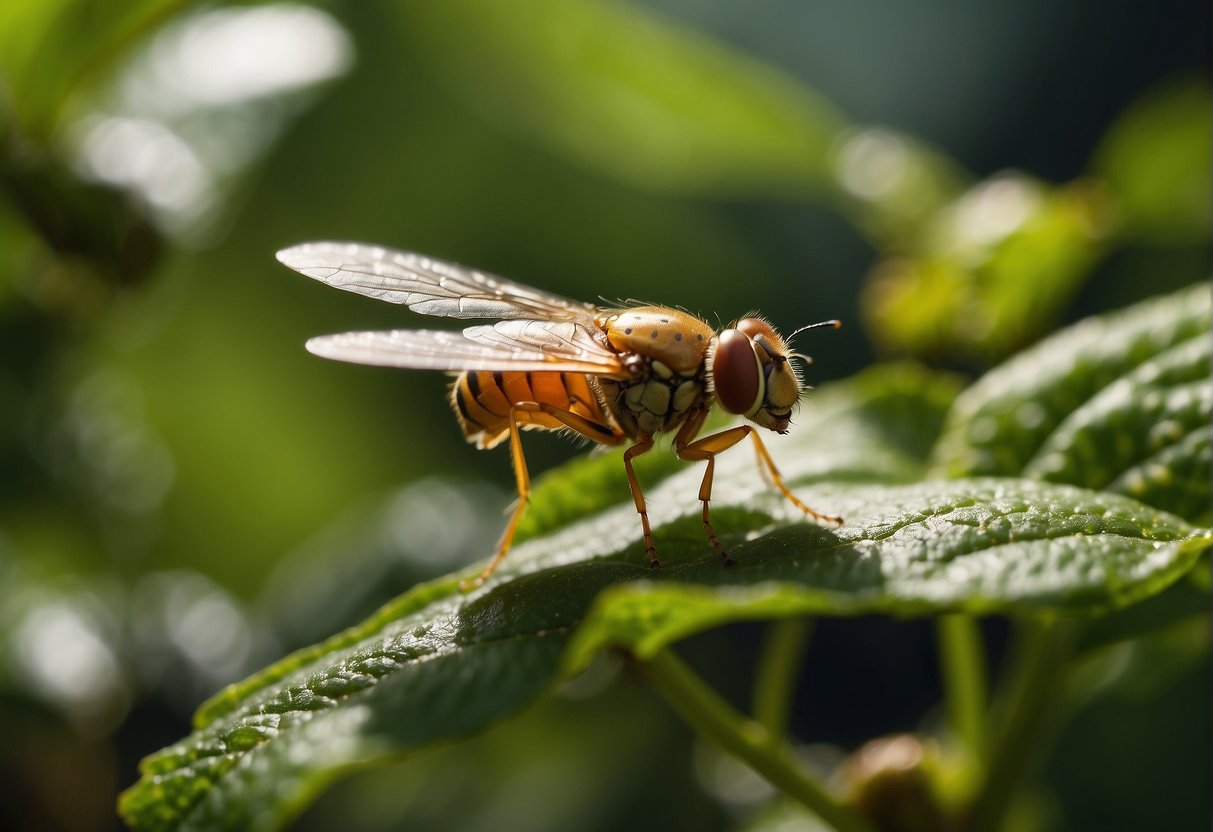
Fruit flies lay their eggs on the surface of fruits and vegetables, and the larvae feed on the flesh of the produce. This can lead to premature spoilage, reduced crop yields, and even the spread of disease. In addition to damaging crops, fruit flies can also be a nuisance in the home, where they are attracted to overripe or rotting fruits and vegetables.
Controlling fruit flies in plants can be a challenge, but there are several methods that can be effective. These include removing and disposing of infested produce, using traps and baits, and implementing good sanitation practices. By understanding the behavior and life cycle of fruit flies, gardeners and farmers can take steps to prevent and control infestations, protecting their crops and plants from damage.
Understanding Fruit Flies
Fruit flies are small insects that belong to the Drosophila genus. These flies are commonly found in the vicinity of fruits and vegetables, and are known to be a nuisance in households and agricultural settings. Understanding the life cycle and common habitats of fruit flies is important in controlling their population.
Life Cycle of Fruit Flies
The life cycle of fruit flies consists of four stages: eggs, larvae, pupae, and adults. Fruit flies lay their eggs on the surface of fruits and vegetables, and these eggs hatch into larvae within a day. The larvae feed on the fruit and grow in size, before entering the pupal stage. The pupal stage lasts for about a week, after which the adult fruit fly emerges.
Common Habitats and Breeding Grounds
Fruit flies are attracted to moist and decaying organic matter, which serves as their breeding ground. They can be found in trash cans, drains, compost piles, and overripe fruits and vegetables. It is important to identify and eliminate these breeding grounds to control the population of fruit flies.
In households, fruit flies can be controlled by maintaining cleanliness and hygiene, and by storing fruits and vegetables in sealed containers. In agricultural settings, fruit flies can be controlled by using traps and insecticides.
In conclusion, understanding the life cycle and common habitats of fruit flies is crucial in controlling their population. By eliminating their breeding grounds and implementing control measures, fruit fly infestations can be prevented.
Prevention and Control in the Home
Fruit flies are a common nuisance in homes, especially during the warm months. Fortunately, there are several effective prevention and control measures that can be taken to keep fruit fly populations in check.
Sanitation Practices
One of the most important steps in preventing fruit flies is to maintain good sanitation practices. Fruit flies are attracted to ripe and rotting fruits and vegetables, so it is important to keep the kitchen and garbage areas clean and free of food debris. Regularly emptying and cleaning garbage cans and compost bins can also help to prevent fruit fly infestations.
Natural Repellents and Beneficial Plants
Certain plants can help to repel fruit flies, and beneficial insects such as ladybugs and parasitic wasps can help to control fruit fly populations. Some plants that repel fruit flies include lavender, basil, and peppermint, while marigolds can attract beneficial insects. Additionally, neem oil can be used as a natural insecticide to control fruit fly populations.
Chemical and Biological Solutions
In addition to natural remedies, there are also chemical and biological solutions that can be used to control fruit flies. Fruit fly traps can be effective in capturing adult fruit flies, while biological control agents such as nematodes and entomopathogenic fungi can be used to target fruit fly larvae. Chemical insecticides should be used as a last resort, and only after all other prevention and control measures have been exhausted.
By following these prevention and control measures, homeowners can effectively manage fruit fly populations and keep their homes free of these pesky insects.
DIY Fruit Fly Traps and Remedies
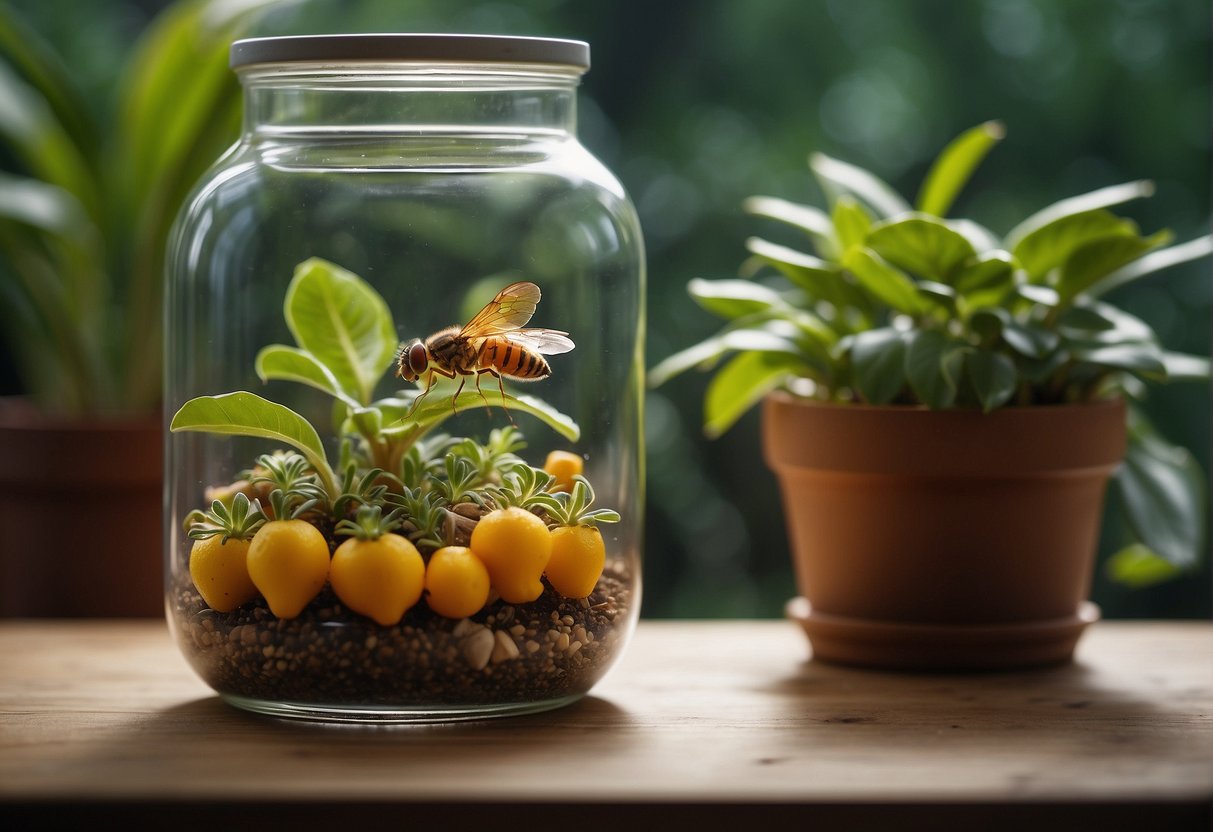
Fruit flies can be a nuisance when they invade your plants. Fortunately, there are several DIY fruit fly traps and remedies that you can use to get rid of them. Here are some effective methods to consider:
Vinegar-Based Traps
Vinegar is a popular ingredient in fruit fly traps because it attracts them with its sweet smell. Here’s how to make a vinegar-based trap:
- Pour apple cider vinegar into a small bowl.
- Add a few drops of dish soap and mix well.
- Cover the bowl with plastic wrap and poke a few holes in it.
- Place the trap near your plants.
The fruit flies will be attracted to the vinegar and fly into the trap. The dish soap will break the surface tension of the vinegar, causing the flies to sink and drown.
Sticky and Fly Traps
Sticky traps are another effective way to catch fruit flies. These traps work by attracting the flies with a sticky substance that they can’t escape from. Here’s how to make a sticky trap:
- Cut a piece of cardboard into a rectangle.
- Cover one side of the cardboard with a sticky substance like honey or petroleum jelly.
- Hang the trap near your plants.
Alternatively, you can use a store-bought fly trap that comes with a sticky surface. These traps are easy to use and dispose of.
Home Remedies
There are several home remedies that you can use to repel fruit flies from your plants. Here are some options:
- Rubbing alcohol: Mix equal parts rubbing alcohol and water in a spray bottle. Spray the mixture on your plants to repel fruit flies.
- Essential oils: Mix a few drops of essential oils like peppermint, eucalyptus, or lavender with water in a spray bottle. Spray the mixture on your plants to repel fruit flies.
- Vinegar: Mix equal parts vinegar and water in a spray bottle. Spray the mixture on your plants to repel fruit flies.
These home remedies are safe and effective ways to keep fruit flies away from your plants.
By using these DIY fruit fly traps and remedies, you can keep your plants free from these pesky insects. Try them out and see which method works best for you.
Garden and Outdoor Management
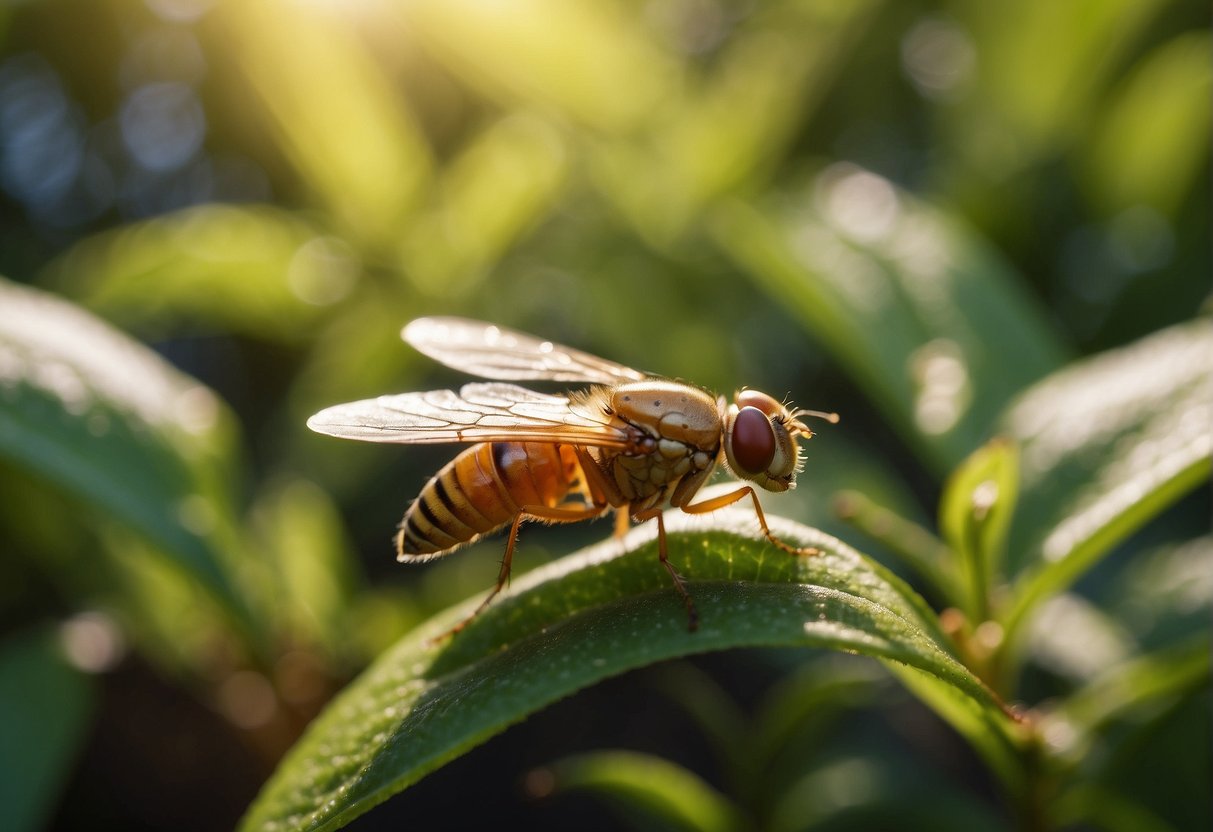
Protecting Plants and Harvest
Fruit flies are a common pest that can damage garden plants and ruin a ripened or overripe fruit harvest. To protect plants and harvest, it is important to remove any decaying matter from the garden, including fallen fruit, leaves, and other plant debris. These materials can serve as breeding sites for fruit flies and other pests.
In late summer, when fruit is ripened, it is important to harvest it promptly. Overripe fruit should be removed from the plant and disposed of properly. If left on the plant, overripe fruit can attract fruit flies and other pests, which can then lay eggs and breed.
Controlling Outdoor Breeding Sites
Compost heaps can be a breeding ground for fruit flies and other pests. To prevent this, it is important to maintain the compost heap properly by turning it regularly and keeping it moist but not too wet. Adding beneficial nematodes to the compost heap can also help control fruit fly populations.
In addition, it is important to keep outdoor areas clean and free of decaying matter. This includes removing fallen leaves, pruning dead branches, and cleaning up any spilled or decaying fruit. Regularly inspecting plants for signs of fruit fly infestation can also help prevent the spread of the pest.
By following these simple tips, gardeners can effectively manage fruit fly populations in their outdoor spaces and protect their plants and harvest from damage.
Professional Extermination and Long-Term Strategies
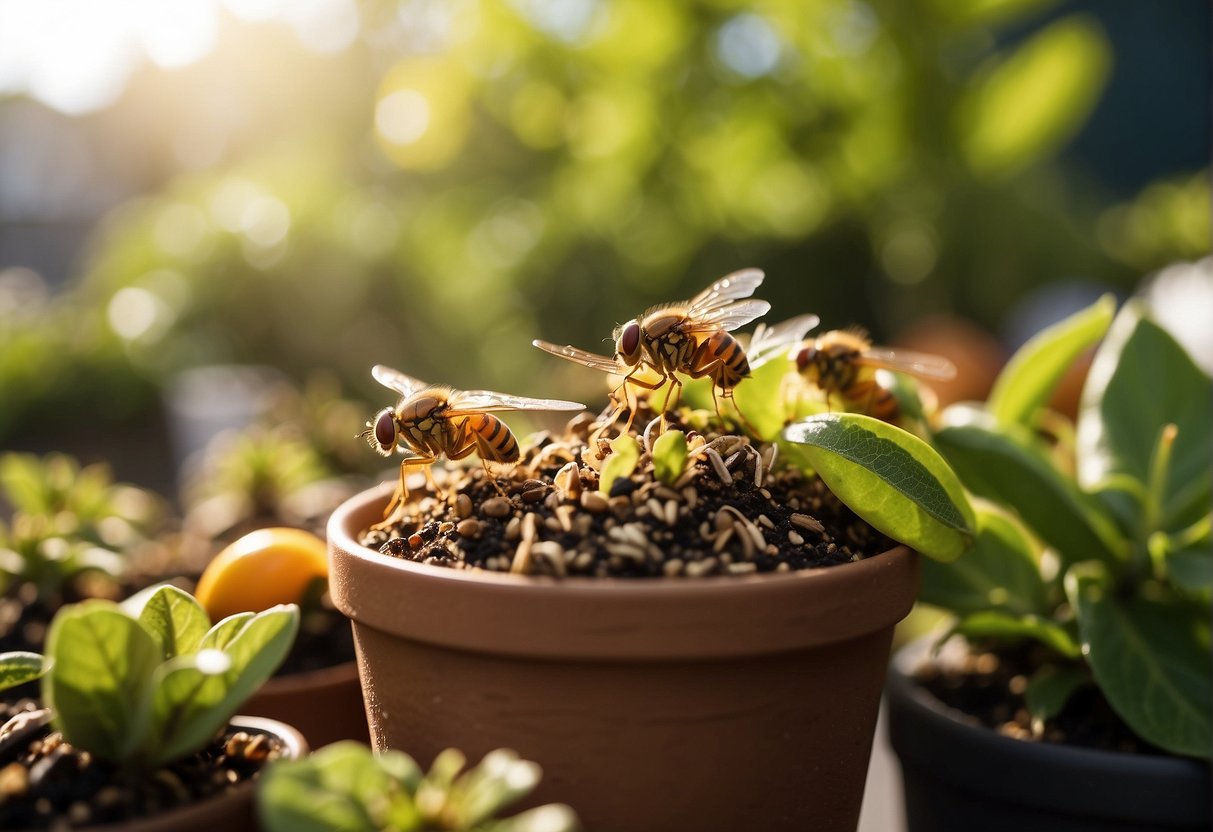
When to Call an Exterminator
If a fruit fly infestation is severe or ongoing, it may be necessary to call in a professional exterminator. Exterminators have access to specialized tools and pesticides that can quickly and effectively eliminate fruit flies and prevent future infestations. It is important to choose an exterminator who has experience dealing with fruit flies and who uses safe and effective methods.
Before calling an exterminator, it is important to try other methods of control, such as removing affected plants and improving sanitation practices. If these methods do not work, it may be time to call in a professional.
Ongoing Monitoring and Maintenance
Even after an infestation has been eliminated, it is important to continue monitoring plants for signs of fruit flies. Regular inspections can help catch new infestations early and prevent them from spreading.
In addition to monitoring, ongoing maintenance practices can help prevent future infestations. This includes proper watering and fertilization, as well as removing any dead or decaying plant matter. Biological control methods, such as introducing natural predators of fruit flies, can also be effective in preventing infestations.
By combining professional extermination with ongoing monitoring and maintenance, it is possible to effectively control fruit fly infestations and keep plants healthy and thriving.
Frequently Asked Questions
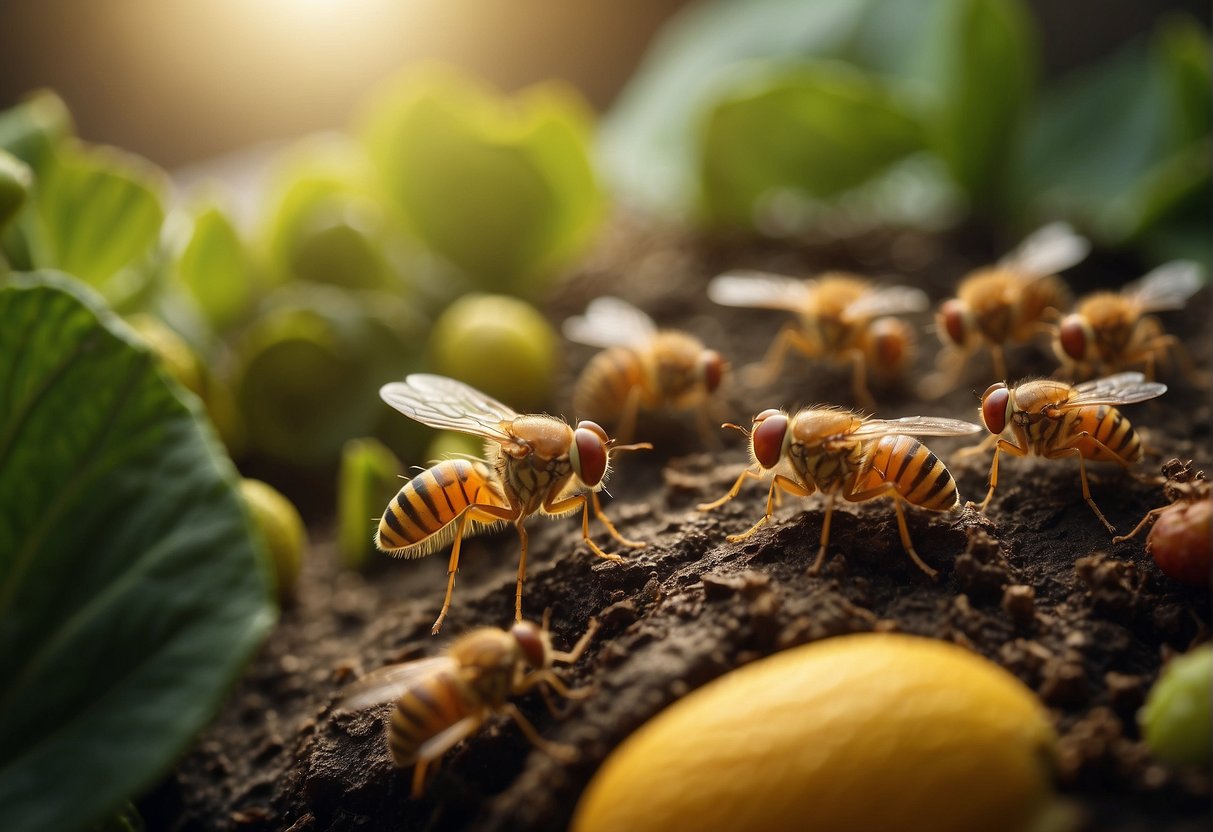
What are the most effective methods to eliminate fungus gnats in houseplant soil?
The most effective methods to eliminate fungus gnats in houseplant soil include reducing watering frequency, allowing the soil to dry out completely between waterings, and using sticky traps to capture adult gnats. It is also recommended to replace the top layer of soil with fresh, sterile soil to prevent the larvae from developing.
Can natural remedies be used to control fruit fly infestations in indoor plants?
Yes, natural remedies can be used to control fruit fly infestations in indoor plants. Some effective remedies include placing apple cider vinegar traps near the plants, using a mixture of dish soap and water to spray the plants, and introducing natural predators such as nematodes or predatory mites.
What are the steps to eradicate small black flies from my indoor plants?
The steps to eradicate small black flies from indoor plants include identifying the source of the infestation, reducing watering frequency, and using sticky traps to capture adult flies. It is also recommended to replace the top layer of soil with fresh, sterile soil to prevent the larvae from developing.
Why are my houseplants attracting fruit flies and how can I prevent this?
Houseplants can attract fruit flies due to overwatering, decaying plant matter, or the presence of ripe or rotting fruit nearby. To prevent fruit fly infestations, it is important to reduce watering frequency, remove any decaying plant matter, and keep ripening fruit in sealed containers or in the refrigerator.
What are the best products to use for getting rid of gnats in potted plants?
Some of the best products to use for getting rid of gnats in potted plants include sticky traps, insecticidal soap, and neem oil. It is important to follow the instructions carefully when using these products to avoid harming the plants.
How can I treat the soil of my house plants to remove flies without harming the plants?
To treat the soil of house plants to remove flies without harming the plants, it is recommended to use natural remedies such as a mixture of dish soap and water or introducing natural predators such as nematodes or predatory mites. It is important to avoid using harsh chemicals that may harm the plants or the environment.


